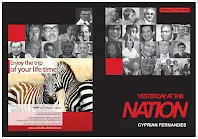WHY DID I DO IT?
That is a question that most East
African Goans would like to ask me about writing my books but never do. The
answer is quite simple, really. Two years after I lost my wife Ruffy (2007) I
was lost. I desperately needed to find myself again. After several visits to a
psychiatrist and a psychologist who, after a month, told me “There was nothing
wrong” with me. Their advice was: just do what you love best. That was quite
simple, from a very early agency, even before I was eight years old, I love to
write and tell stories, even yarns that I used to make up. At the age of 11, my
classmate Bill D’Silva and I wrote a one-word play for the school presentation.
It was called Rumour which began with the line: Have you heard, Father Hannon,
the parish priest and principal, tripped at the gates and did a bit of dance to
save himself from falling (or words to that effect)? Everyone in the room was
asked to contribute their version of the rumour and it ended up with Hannon
falling from the roof of the Empire State Building.
I became a sports reporter at the
age of 16 and never looked back. However, in 2009 while looking back on my
career I felt a certain amount of regret for having failed to record the
histories of the Goans communities in East Africa while we were all there. I
had made one or two attempts to interview folks I had known well and respected
utterly. However, most other Goans declined with the usual grace.
One of the Goans I admired most was the Goan karani (clerk) Mervyn Maciel. In Nairobi, I had known his brother Wilfrid well and had shared a lot of beers with him. I had read Mervyn’s anthology as a Goan civil servant in the British colonial service in Kenya. I only met him and his wife Elsie on a visit to the UK. However, we began emailing much before that and my admiration for the man grew with each episode of correspondence. What I celebrated about MM was that he wrote and dealt with the truth, he lived what he wrote about, as did his (late) wife. I am not particularly enamoured of fact disguised as fiction but I like the books by Braz Menezes who also lived in Kenya.
One of my biggest regrets was
that not many parents spoke to their children and grandchildren about their
lives in Goa and Africa. By the time most children reached adulthood, they knew
next to nothing about their parents’ lives.
I was disturbed that I had
written about most subjects in Africa but not about the Goan families. As a
sports reporter, I got to know most Goan sports people. I had also known a lot
of the musicians.
One of the first lessons I was
taught as a young journalist was to “write only what you know” and then only if
it will stack up in court: the truth and the nothing but the truth. In my life,
I have never veered from that advice.
Yesterday in Paradise was
my humble attempt at recording my life, my family’s life, the events of my,
adulthood and the tomorrow that followed our departure from Kenya. It also gave
me a chance to celebrate the country of my birth and pay tribute to some of the
people that played some part in my life or featured in the tapestry of
independent East Africa.
Stars Next Door was also
special to me. The book was a personal tribute to all the people who were
sports stars of my life in East Africa, from a little boy who carried a football
player’s boots and walked with the play from home to the ground. Oscar D’Souza
debated hockey with me at his home until the very early mornings and Irene
(late) never shooed us. Hilary Fernandes was always ready to impart his vast
knowledge as was Edgar Fernandes, Surjeet Singh Jnr (late) and a host of other
people. The book also gave me a chance to celebrate all the musicians and
dancers who made our lives that much more beautiful. I was involved in a band
as a so-called manager from the age of 12. I had produced four variety shows with casts of as many as 150. I loved them all.
Yesterday at the Nation gave
me a chance to celebrate everyone there and pay tribute to an institution that
gave a 16-year-old kid a break, a kid who had been forced to leave school at 12
and soar to the giddy heights of journalism, most aspects of it from sports
reporting, investigative reporting, writing features, investigative reporting,
feature writing, reviewing shows, movies etc, laying out pages ….
Twilight of the Exiles was my
continuing effort to celebrate Goans and friends.
Is there another book, my last?
Perhaps, Inshallah!
I also celebrate all those
writers from Africa who have lived the “life” and told their stories firsthand.
My prayer is that parents will
create a human library by sharing lives and histories with their children and
grandchildren.
I also celebrate the achievers in
sport because I doubt if any Goan community will ever achieve the glories we
Goans did in East Africa … there is hope, Canada is making some big strides.
I have been assisted in my efforts by former
Nation Sports Reporter and Editor Norman da Costa and a whole host of other
wonderful people have aided me. I Love ‘em all, especially everyone who has
ever allowed me to write their stories and share them with readers around the
world. Fred Noronha, in Goa, is also a very big help. He published two of my
books. He remains one of the great Goans of his times. Vivek Menezes remains an
inspiration. He is a brilliant writer as well as a terrific photographer.




Comments